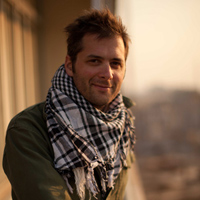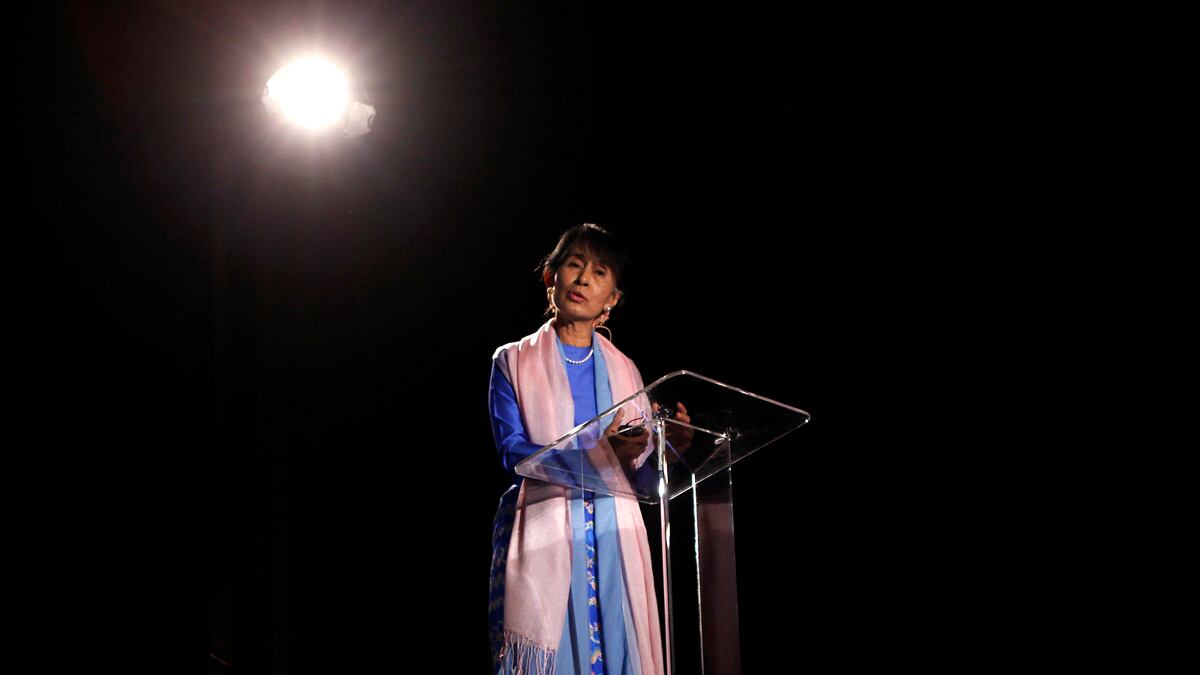Touching down in San Francisco on her whirlwind tour of the United States, Burmese opposition leader Aung San Suu Kyi on Friday received the Vaclav Havel Prize for Creative Dissent from the Human Rights Foundation, an organization whose board included the late Czech president, with whom she corresponded during her years under house arrest.
The event, billed with a theme of “Many Paths, One Goal,” also included a dozen global human-rights activists who gave testimonies of their work reaching for a democratic ideal. (The absence of two scheduled speakers—Egyptian journalist Mona Eltahawy, who was arrested in New York last week for defacing an anti-Muslim subway ad, and Marcel Granier, a Venezuelan radio broadcaster who had his passport canceled days before his flight—illustrated the perils of those paths.)
Manal al-Sharif, a 33-year-old Saudi woman who last June challenged her country’s ban on women driving by organizing a collective protest via YouTube, in which several dozen women openly flouted the long-standing law, told an audience of philanthropists and entrepreneurs that included Google founder Sergey Brin and former Peruvian president Alejandro Toledo: “Few [outsiders] can understand the depth of the issue, because in the rest of the world, it’s a non-issue.”
“In Saudi Arabia, women driving goes beyond the mundane matter of a woman getting her hands on the wheel,” Sharif said. “The freedom of movement that lifting such a ban implies is what has conservative factions in our society so rigid.”
Sharif’s “Women2Drive” campaign sparked a fierce backlash in the kingdom (but inspired this sassy video by the British hip-hop performer M.I.A.): Sharif was jailed for nine days, but only a single driving ticket was issued the day of protest. Saudi’s King Abdullah has since decreed that women be allowed to work openly in retail jobs, employing more than 40,000 Saudi women, and last September, the king granted women the right to vote in future local elections and join the advisory Shura council as full members.
This limited, though extraordinary, expansion of rights has encouraged some to predict a “Saudi Women’s Spring,” but Sharif is quick to put things in perspective. “Let’s be serious: we’re way behind the starting point of those revolutions. Fifty percent [of us] have yet to achieve basic rights.” Social media, Sharif emphasized, has been an indispensable tool for Saudi women “to absolve the gender apartheid.”
“It is our democracy sandbox, our personal bully pulpit,” she said.

From Uganda—“a very beautiful country with very oppressive laws”—gay-rights activist Kasha Jacqueline described the frontlines of the homophobic witch hunt there. Incited, activists claim, by the anti-gay teachings of an American Christian evangelist, Scott Lively of Abiding Truth Ministries, who visited the country three years ago, gays are fighting proposed legislation that would prohibit the "promotion" of gay rights and punish anyone who "funds or sponsors homosexuality" or "abets homosexuality" (gay sex is already outlawed). Already, Ugandan lawmakers are moving to close all gay-advocacy workshops and nonprofits allied with LGBT activists.
Meanwhile, a frightening vigilantism has been unleashed. Two years ago, a newspaper published a photo of a gay-rights activist with the words “Hang Them” on its front page; he was later killed in his house. Just days before flying to San Francisco, Jacqueline rescued a gay man who had been arrested and beaten, on television, as mobs waited outside the police station to burn him alive. Local politicians have urged gays to emigrate; some are kicked out of school, excommunicated from their families. Jacqueline, who founded Uganda’s only LGBT organization, takes many of them in. “I tell them, ‘Come, you have a home.’”
Sweden and Britain have threatened to cut aid to Uganda if the parliament bill is passed, but cutting aid “makes us a scapegoat for our country,” Jacqueline said.
“We’ve stood ground. We wear our rainbows. Even if I never live to see the freedom that I’m fighting for today, at least I’ve been part of the foundation for the future generations.”
For Bolat Atabayev, a well-known theater director from Kazakhstan, “the moment of truth came when I realized we were building the wrong country.” Since independence from the Soviet Union in 1991, Kazakh president Nursultan Nazarbayev has ruled the resource-rich nation virtually unchallenged (in 2010 he was granted the lifelong title of "leader of the nation"). Corruption, Atabayev said, has made “honest business impossible” and “paralyzed government structures.”
For the past 14 years, Atabayev has voiced his dissent. (“I said [to myself], ‘Pull your ass off the couch and do what you need to do.’”) Last year, Atabayev was arrested for seven months for supporting an oil workers strike—the first of its kind—in a western region heavily invested by Western energy companies. Some 7,000 workers protested for better wages and management, but were brutally suppressed: police shot 12 people dead, according to a report published this month by Human Rights Watch that implicated three oil companies and the Kazakh government with abuses.
“On the one side of the scale, we have the democratic values—human rights, the freedom of speech—and on the other scale we have the natural resources of Kazakhstan,” Atabayev said yesterday. “It looks like the natural resources cup is getting heavier. But behind those natural resources, you should see the tears of common people.”
When Suu Kyi spoke, she framed Burma’s own democratic struggle as “the long path to freedom.”
Recalling the last letter she had received from Vaclav Havel, Suu Kyi said: “He was ill, but his concern was only for me, for us in Burma,” she said. “He was very aware of the fact that were about to embark on the most difficult part of our own road. We had started to change our country. We had been given the opportunity to change. But the moment you are freer, more choices open to you, and whether or not you make the right ones is your responsibility.
“As I go forward with my people towards the goal that seems so near ... I would like you to help us to make the right choices.”
Coincidentally, a few blocks from where Suu Kyi spoke, thousands of bicyclists weaved through San Francisco’s streets for the 20th Anniversary of Critical Mass, the monthly protest ride of sorts now held in 300 cities worldwide. Their own path would probably last just a few miles, likely ending in a bar. But Suu Kyi’s final remarks still applied: “There will always be the struggle to free ourselves from our own human weaknesses—and that is the longest road to freedom that each one of us has to take for ourselves,” she said.



